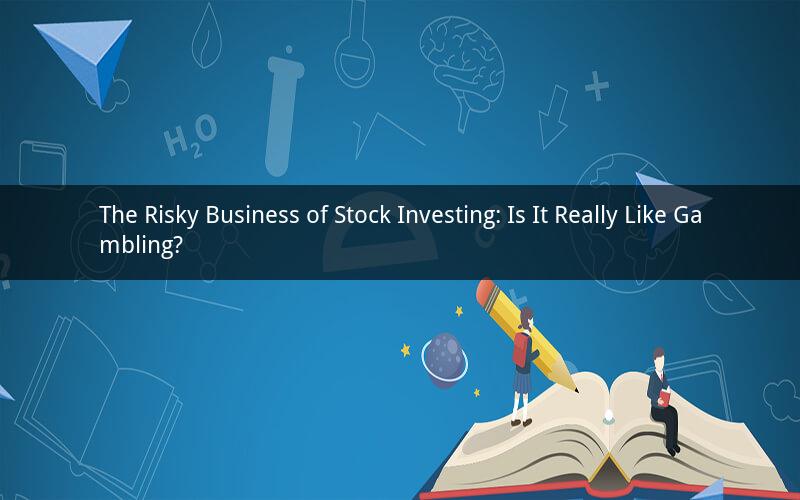
Investing in stocks has long been considered a critical step towards financial freedom and wealth accumulation. However, some individuals view stock investing as a form of gambling, where the outcome is uncertain and relies heavily on chance. This article aims to explore the similarities and differences between investing in stocks and gambling, shedding light on the risks involved and the mindset required to succeed in both worlds.
Stock investing and gambling share several common elements. Firstly, both activities involve placing a bet on the future performance of an asset. When you invest in stocks, you are essentially betting that the value of the shares will increase over time, allowing you to sell them at a higher price and profit. Similarly, in gambling, you are betting on the outcome of an event, such as a sports game or a lottery, with the hope of winning money.
Secondly, both stock investing and gambling are subject to a degree of unpredictability. While stock market trends can be analyzed and predicted to some extent, they are never guaranteed. The same goes for gambling outcomes; no matter how much research you conduct or how well-informed you are, there is always an element of chance involved. This uncertainty can lead to both gains and losses, making both activities risky by nature.
However, despite these similarities, there are significant differences between stock investing and gambling. One of the most notable distinctions is the level of skill and knowledge required to succeed in each activity. While gambling is primarily based on chance, stock investing requires a solid understanding of financial markets, company fundamentals, and economic indicators.
Stock investing involves analyzing a company's financial statements, such as its balance sheet, income statement, and cash flow statement, to determine its current and future value. Investors also need to stay informed about the broader economic environment, industry trends, and political events that can impact the stock market. This level of analysis and research is not typically required in gambling.
Moreover, the potential for long-term gains is much higher in stock investing compared to gambling. By investing in a diversified portfolio of stocks, you can benefit from the compounding effect of reinvested dividends and capital gains over time. In contrast, gambling often involves short-term, one-time bets, with the potential for only immediate gains or losses.
Despite these differences, some individuals still argue that stock investing is akin to gambling. Here are five reasons why they may hold this viewpoint:
1. The element of chance: Just as in gambling, stock investing is influenced by unpredictable market movements and external factors that are beyond the investor's control.
2. The potential for high risk: Both stock investing and gambling can lead to significant financial losses if not approached with caution.
3. The psychological aspect: Investors may experience similar emotions and behaviors as gamblers, such as chasing losses or making impulsive decisions based on emotions rather than rational analysis.
4. The reliance on luck: Some investors may believe that luck plays a significant role in stock market success, just as it does in gambling.
5. The allure of quick riches: Both stock investing and gambling can be appealing to individuals seeking fast and easy ways to make money, often ignoring the long-term, disciplined approach required for successful investing.
To address these concerns, here are five questions and their corresponding answers:
1. Q: How can an investor minimize the risk of losing money in the stock market?
A: Investors can minimize risk by diversifying their portfolios, conducting thorough research on potential investments, and maintaining a long-term investment horizon.
2. Q: Can investing in stocks be considered a form of gambling?
A: While there are similarities between stock investing and gambling, investing in stocks is more akin to a business venture that requires research, analysis, and discipline.
3. Q: How can an investor avoid making impulsive decisions in the stock market?
A: Investors can avoid impulsive decisions by setting clear investment goals, developing a well-thought-out investment strategy, and sticking to it, even in the face of short-term market volatility.
4. Q: What role does luck play in stock market success?
A: While luck can play a role in short-term market movements, long-term success in stock investing is more likely to be achieved through skill, knowledge, and disciplined decision-making.
5. Q: Is it possible to make money from stock investing without the risk of losing money?
A: No investment is without risk, but by adopting a disciplined and well-researched approach, investors can minimize their chances of losing money and increase their chances of achieving long-term financial success.
In conclusion, while there are some similarities between stock investing and gambling, the key difference lies in the level of skill, knowledge, and discipline required to succeed. By understanding the risks involved and approaching the stock market with a rational mindset, investors can increase their chances of achieving long-term financial success without succumbing to the allure of quick riches or the risks associated with gambling.